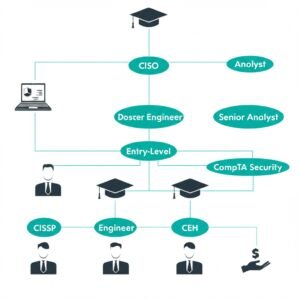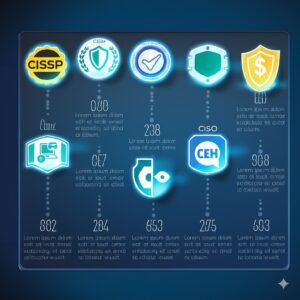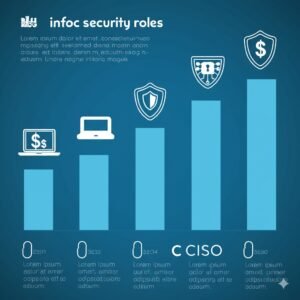When I first started diving into the world of cybersecurity, I had this question stuck in my mind: “Does cybersecurity teach hacking?” It seems like a no-brainer, right? You hear about hackers all the time, and cybersecurity seems like the opposite of hacking. But let me tell you, the line between cybersecurity and hacking isn’t as clear-cut as it seems. There’s a lot of overlap between the two fields, and here’s why understanding hacking is such a critical part of cybersecurity.
Cybersecurity and Hacking
At first glance, cybersecurity and hacking seem like opposite ends of the spectrum. Cybersecurity is all about protecting systems, networks, and data, while hacking typically refers to breaching these systems. But here’s the catch: To effectively protect systems, cybersecurity experts must understand how attackers work. That’s where ethical hacking comes in.
When you study cybersecurity, you’re not just learning how to install firewalls or configure encryption. You’re also taught how hackers think, what tactics they use, and how they exploit weaknesses. The idea is to anticipate what the bad guys might do, so you can set up strong defenses against them.

What Is Ethical Hacking?
Ethical hacking is like the spy who works for the good guys. These hackers use the same tools and methods as malicious hackers, but they do it with the permission of the organization to find vulnerabilities in their systems. By simulating attacks, ethical hackers give companies a chance to fix these weaknesses before a real hacker can exploit them.
In a typical cybersecurity curriculum, you’ll learn about penetration testing, which is essentially ethical hacking. You simulate a cyberattack on a system to identify vulnerabilities so the system can be better protected. These exercises teach you how to think like a hacker, which is incredibly useful for building strong defenses.
The Role of Hacking in Cybersecurity Education
Many people think that cybersecurity courses are all about preventing cyberattacks and securing data. While that’s true, the field also involves a lot of offensive strategies. Offensive security, like penetration testing, is a major part of cybersecurity training.
I remember when I was studying cybersecurity, and we had to do a penetration testing exercise. It felt like I was part of a secret mission, trying to infiltrate a system but with good intentions. It was thrilling! I had to break into a network to find vulnerabilities, and after gaining access, I had to report back on what I found and suggest ways to fix it. That’s the beauty of cybersecurity: you get to learn how to think like a hacker so you can stop them before they strike.
Why Do Cybersecurity Professionals Learn Hacking?
Learning hacking techniques might sound like you’re being taught to break into systems, but in reality, it’s about learning how to defend systems better. Imagine you’re a guard protecting a castle. To understand where your defenses are weakest, you have to understand the mindset of the attackers. You have to know how someone could try to break in, what tools they would use, and what methods they would employ.
By studying hacking, cybersecurity professionals can:
- Identify vulnerabilities in networks and systems.
- Simulate attacks to find weaknesses.
- Develop more robust security measures to protect data.
Ethical Hacking vs. Malicious Hacking: The Key Differences
When you dive deeper into ethical hacking, it becomes clear that there’s a significant difference between ethical and malicious hacking. Ethical hackers have permission to access and test systems. Malicious hackers, on the other hand, operate illegally and cause harm.
The ethical hacker’s role is about protecting systems, while the malicious hacker’s goal is to exploit vulnerabilities for personal gain or to cause damage. Think of it as the difference between a firefighter who knows how to start a fire for training purposes and an arsonist who sets fires to destroy property.

Cybersecurity Education and Real-World Application
So, does cybersecurity teach hacking? Yes, but with a twist! Cybersecurity education gives you the skills to think like a hacker, but it’s always focused on helping businesses secure their data and networks. After all, defense is the primary goal. The idea is not to teach you how to harm but how to protect by simulating real-world scenarios where hackers could strike.
Two Types of Hacking Taught in Cybersecurity
In my studies, I learned about two major types of ethical hacking that are integral to cybersecurity: white-box and black-box penetration testing.
| Type of Hacking | Description |
|---|---|
| White-box Testing | You are given complete information about the target system. This allows for deeper testing of vulnerabilities. |
| Black-box Testing | You are given no information, simulating a real-world attack. It’s a more realistic test for system defenses. |
These exercises help develop different strategies for testing security systems, allowing you to gain practical experience.
How to Get Started with Ethical Hacking?
If you’re considering a career in cybersecurity, learning about hacking is essential. Here’s what you can do to get started:
- Get the Right Education: Whether it’s a degree in cybersecurity or an online course, start by building a strong foundation.
- Earn Certifications: Certifications like Certified Ethical Hacker (CEH) or Offensive Security Certified Professional (OSCP) can help you stand out in the field.
- Practice, Practice, Practice: Use platforms like TryHackMe or Hack The Box to hone your skills in a hands-on, practical environment.
With time and dedication, you’ll be able to think like a hacker and develop robust defenses to protect systems.
Conclusion
To answer the question, yes, cybersecurity does teach hacking. But it’s not about learning to break into systems for malicious purposes; it’s about gaining the skills to protect systems from those who would. Cybersecurity professionals need to understand the tactics used by hackers to anticipate and prevent attacks. It’s like learning the enemy’s playbook so you can stop them before they even make a move.

FAQs
Does cybersecurity teach hacking?
Yes, cybersecurity programs teach ethical hacking to help professionals understand vulnerabilities and protect systems.
What is ethical hacking?
Ethical hacking involves simulating attacks to find weaknesses in systems to improve security.
Is penetration testing part of cybersecurity?
Yes, penetration testing (ethical hacking) is a major component of cybersecurity education.
What are the types of ethical hacking?
The two main types are white-box and black-box testing, which offer different levels of access and simulation.
What skills are needed to become an ethical hacker?
You need skills in networking, operating systems, programming, and understanding how hackers operate.
Can I learn ethical hacking on my own?
Yes, many people start by self-studying using online platforms and certifications, but practical experience is crucial.
Why is learning hacking important in cybersecurity?
Understanding hacking helps you anticipate attacks and build defenses, which is essential for protecting systems effectively.

